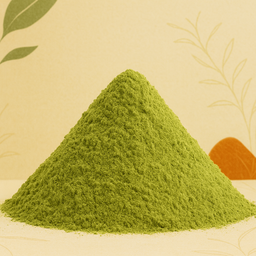Alfalfa: The Mighty Little Plant That Packs a Punch
What’s the Deal with Alfalfa?
Alfalfa (Medicago sativa), often called lucerne, is way more than just a humble plant you might find in a field or sprouting on your sandwich. This perennial legume has been a staple in farming for ages, mostly as animal feed, but it’s also a superstar in the world of nutrition and herbal medicine. Think of it as a green powerhouse loaded with vitamins, minerals, and compounds that can do some pretty cool things for your health. Let’s dive into what makes alfalfa so special, from its key ingredients to the ways it can give your body a boost.
What’s Inside Alfalfa?
Alfalfa is like a natural multivitamin with a side of superpowers. Here’s the breakdown of what it’s got going on:
Vitamins and Minerals: It’s packed with vitamins A, C, E, K, and some B vitamins, plus minerals like calcium, magnesium, iron, and potassium. It’s basically a salad bar in plant form!
Flavonoids: These are antioxidants like apigenin and luteolin that fight off harmful free radicals, keeping your cells happy.
Saponins: Fancy compounds that can help lower cholesterol and even fight off microbes.
Phytoestrogens: Plant-based compounds like genistein and daidzein that act a bit like estrogen, which might help with hormonal balance.
Alkaloids: Tiny amounts of stuff like stachydrine that could give your heart a little extra love.
Why You Might Want to Get to Know Alfalfa
Alfalfa isn’t just food for cows—it’s got some serious health perks for humans too. Here’s what the science says about its benefits:
1. Keeps Cholesterol in Check
Got high cholesterol? Alfalfa might be your new best friend. Those saponins we mentioned? They grab onto bile acids in your gut, which helps your body flush out bad cholesterol (LDL). One study showed that people who took alfalfa supplements saw their LDL drop by up to 18% in just eight weeks. That’s a big win for your heart!
2. Fights Off Oxidative Stress
Free radicals are like tiny troublemakers in your body, causing damage that can lead to things like heart disease or cancer. Alfalfa’s flavonoids and vitamin C act like bodyguards, neutralizing those troublemakers and keeping your cells safe. Research has shown alfalfa extracts are great at scavenging free radicals, which means it’s a solid ally against oxidative stress.
3. Calms Inflammation
If your body’s dealing with chronic inflammation (think joint pain or other pesky issues), alfalfa might help cool things down. Studies on animals have shown that its flavonoids and saponins can lower levels of inflammatory markers, like TNF-α, which could make it useful for conditions like arthritis.
4. Supports Blood Sugar and Metabolism
Alfalfa could be a game-changer for folks managing diabetes or blood sugar issues. Its phytoestrogens and fiber seem to help improve insulin sensitivity and keep blood sugar levels steady. In one study with diabetic rats, alfalfa extracts lowered blood glucose, hinting at its potential for humans too.
5. Nutrient Powerhouse
Need a nutrient boost? Alfalfa’s got you covered. Its vitamin K is great for blood clotting and strong bones, while its iron and folate can help if you’re feeling run-down or dealing with anemia. It’s like a natural energy shot without the caffeine jitters.
A Few Things to Watch Out For
Alfalfa is generally safe, but it’s not perfect for everyone. Eating too much might upset your stomach or, thanks to its chlorophyll, make your skin sensitive to sunlight. If you’ve got an autoimmune condition like lupus, steer clear—alfalfa can rev up your immune system, which isn’t always a good thing. Also, if you’re pregnant or breastfeeding, check with your doctor before adding alfalfa to your routine.
Wrapping It Up
Alfalfa (Medicago sativa) is a little plant with big potential. Whether you’re looking to lower cholesterol, fight inflammation, or just load up on nutrients, it’s got something to offer. From its antioxidant-packed flavonoids to its cholesterol-busting saponins, alfalfa is like a Swiss Army knife for health. Just be mindful of how much you’re using and any health conditions you might have. Want to give it a try? You can find alfalfa in supplements, teas, or even as sprouts in your local grocery store. Here’s to this green gem doing some good for your body!
References:
Bora, K. S., & Sharma, A. (2011). Phytochemical and pharmacological potential of Medicago sativa: A review. Pharmaceutical Biology, 49(2), 211–220.
Stoica, A., et al. (2013). Antioxidant activity of alfalfa (Medicago sativa) extracts. Journal of Food Biochemistry, 37(5), 651–658.
Guney, M., et al. (2013). Saponins from Medicago sativa: Chemical characterization and biological activity. Natural Product Research, 27(10), 888–891.
Patisaul, H. B., & Loria, S. M. (2010). The physiological effects of phytoestrogens in the diet. Endocrine Reviews, 31(3), 403–423.
Molgaard, J., von Schenck, H., & Olsson, A. G. (1987). Alfalfa seeds lower low density lipoprotein cholesterol and lipoprotein (a) concentrations in patients with hyperlipoproteinemia. Atherosclerosis, 65(1-2), 173–179.
Choi, K. C., et al. (2016). Anti-inflammatory effects of Medicago sativa extracts in LPS-induced macrophages. Journal of Ethnopharmacology, 191, 112–118.
Dehghan, M., et al. (2016). Effects of Medicago sativa extract on glucose metabolism in diabetic rats. Phytotherapy Research, 30(8), 1324–1330.










